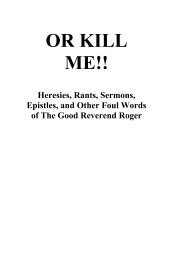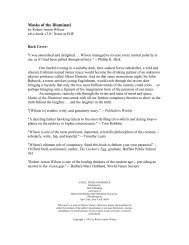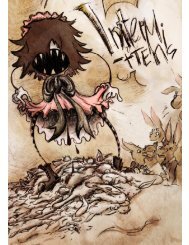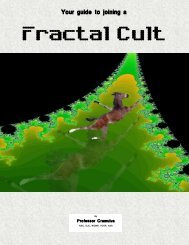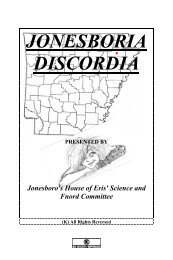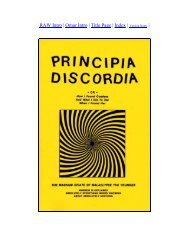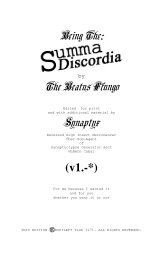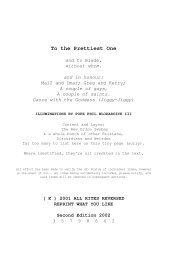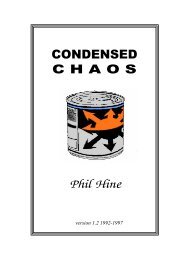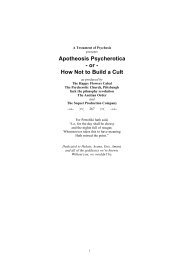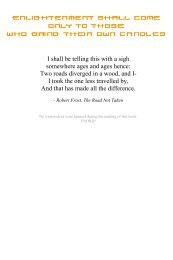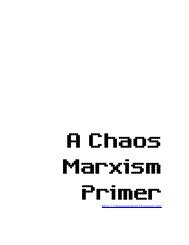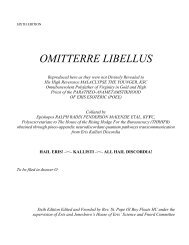Coincidance - Principia Discordia
Coincidance - Principia Discordia
Coincidance - Principia Discordia
Create successful ePaper yourself
Turn your PDF publications into a flip-book with our unique Google optimized e-Paper software.
14 COINCIDANCE<br />
but the other wasn't, some that both were sexual, etc.) Since Joyce believed<br />
(as he wrote in a letter) that Ireland, like Sicily, is ruled by omerta (silence),<br />
Swift is a fit symbol of the Irish people's (or any colonial people's) obsession<br />
with hiding what they are doing.<br />
At this point, the equation seems to be: Swift = = the guilty man in the<br />
Freudian bushes; the two Esthers = = the two girls in the bushes; and,<br />
remarkably, the three soldiers = = Peter, Jack and Martin in Swift's<br />
Tale of a Tub. But Peter, Jack and Martin, in Swift, symbolize respectively the<br />
Roman Catholic, Calvinist and Lutheran religions (Peter = thuartpeatrick,<br />
Jack = John Calvin, Martin - Martin Luther) and Christianity has become<br />
three forms of evasion of Freudian guilt, which may or may not be what<br />
Swift had in mind.<br />
Contemporary with Swift and also Irish was Lawrence Sterne, author of<br />
Tristram Shandy. Joyce commented in a letter to Harriet Weaver that Swift<br />
and Sterne should have changed names, because Swift's writings were<br />
stern and Sterne's writings were swift. Swift and Sterne are thus versions<br />
of Joyce's Cain/Abel dualism, or , the male or yang equivalent of the<br />
female or yin polarity. The Swift-Sterne oxymoron appears dozens of<br />
times in FW) e.g., "he sternly struck his tete in a tub ... (and) swiftly took it<br />
out again," "the siamixed twoatalk used twixt stern swift and jolly roger,"<br />
etc. Joyce may or may not have known the coincidence that Swift's<br />
predecessor as Dean or Saint Patrick's in Dublin was also named Stern; but<br />
Joyce was aware, and commented in another letter to Ms. Weaver, that die<br />
Sterne in German not only means "the star" but also glaucoma—the eye<br />
disease from which he himself was suffering while writing FW.<br />
Joyce, in fact, first played with this English-German pun (Sterne/star/<br />
glaucoma) as far back as 1918 when he wrote "Bahnhofstrasse," a poem<br />
describing his first hideously painful glaucoma attack on Bahnhofstrasse in<br />
Zurich:<br />
Ah, star of evil! star of pain!<br />
Highhearted youth comes not again<br />
Glaucoma comes from the Greek, glaucis, shining, and is an epithet<br />
Homer habitually applies to the eyes of Athene, who was originally an owl<br />
goddess and is usually shown with an owl in Greek statuary. Athene was<br />
the goddess of juries, and we will come to know the twelve jurors (O) in FW<br />
intimately before the end of this book; for now it is enough to note that<br />
when they first appear, as mourners at Finnegan's wake in chapter one,<br />
they utter "a plethora of ululation." To ululate etymologically means to<br />
moan like an owl—a typical example of the psycho-archeology of Joyce's



